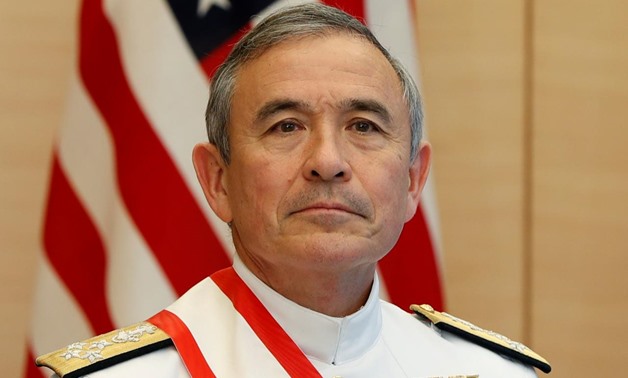
FILE PHOTO - Admiral Harry Harris, Commander of the United States Pacific Command, waits for arrival of Japan's Prime Minister Shinzo Abe (not in picture) before their meeting at Abe's official residence in Tokyo, Japan April 26, 2018. REUTERS/Issei Kato/
WASHINGTON - 19 May 2018: U.S. President Donald Trump on Friday nominated Admiral Harry Harris, head of the U.S. Pacific Command, as U.S. ambassador to South Korea ahead of a summit with North Korean leader Kim Jong Un scheduled next month but since called into question by Pyongyang.
If confirmed by the Senate, Harris would fill a post that has been vacant since Trump took office in January 2017.
Harris was initially nominated by Trump to be U.S. ambassador to Australia but was asked last month by Mike Pompeo, now secretary of state, to take the post in Seoul instead, as diplomatic efforts to resolve the crisis over North Korea's nuclear weapons intensified.
His formal nomination, announced by the White House, comes days after North Korea raised doubts about whether an unprecedented June 12 summit in Singapore between Kim Jong Un and Trump would go ahead, and Pyongyang called off talks with South Korea, whose president, Moon Jae-in, is due to meet Trump at the White House on Tuesday.
Despite professed unity, Trump has often taken a harder line on North Korea than Moon, and the U.S. president has repeatedly criticized South Korea over trade while questioning the usefulness of the long-standing U.S. alliance with Seoul.
On Thursday, Trump sought to placate North Korea after it threatened to call off the summit, saying Kim's security would be guaranteed in any deal and that his country would not suffer the fate of Muammar Gaddafi's Libya.
But in rambling comments mixing words of reassurance with threat, Trump also stressed that North Korea would have to abandon its nuclear weapons and warned that if no deal was reached, it could be "decimated" like Libya or Iraq.
Harris, who is known for hawkish views on China's military expansion, told the U.S. Senate Armed Services Committee in March that Washington could not be overly optimistic about the outcome of a Trump-Kim summit and must go into it with "eyes wide open."
He said he was encouraged by the prospect of a summit, but North Korea remained the biggest Asia-Pacific security threat.
Pompeo told his Senate confirmation hearing for the post of secretary of state last month that filling Seoul and a handful of other diplomatic posts required "immediate attention."
The White House said in February it was no longer considering Victor Cha, a former official who questioned the wisdom of a preventative military strike on North Korea that was mulled by the administration earlier this year.

Comments
Leave a Comment